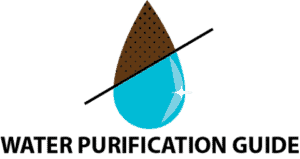Ponds, whether they are stately garden features or cozy pot ponds, bring a sense of tranquility and an element of nature to any setting. However, when the water in your pond turns brown, it can be concerning. Not only does it affect the aesthetic appeal, but it may also signal issues that could be harmful to the inhabitants of the pond, like fish and frogs.
Pond water can go brown from decaying plant material, soil, certain types of algae, fish waste, overfeeding and overstocking of fish, and poor filtration. Tannins from organic matter are not harmful, but removing the decaying material should be approached cautiously to avoid rapid changes in pH or oxygen levels in the water.
In this article, we dive into the various reasons why your pond may have taken on a brownish tinge, what it means for the health of your pond, including its effects on pH, oxygen levels, fish, frogs, and plant life.
Reasons Why Pond Water Goes Brown
1. Decaying Plant Material
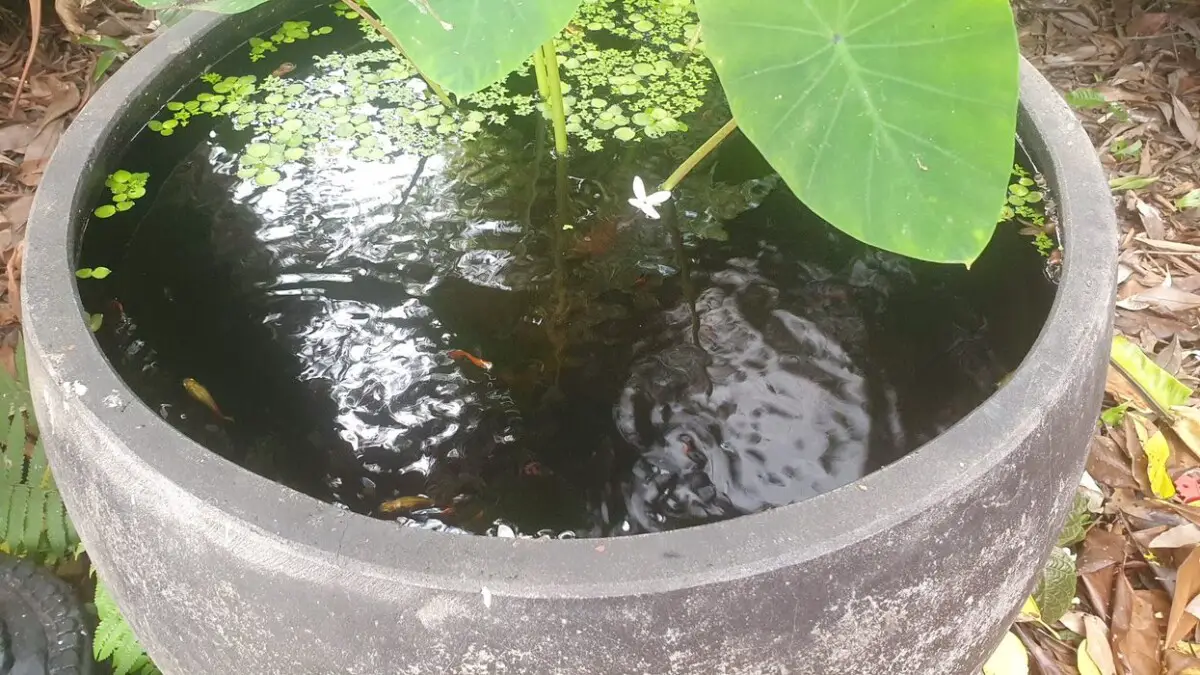
Pond water can take on a brown tinge due to the natural decay of organic materials such as leaves, dead plants, or excess fish food. As these materials break down, they release tannins, which are brown-colored chemical compounds. The presence of tannins can give the water a tea-like color.
My small pot pond (pictured above) often gets a brown tinge because it catches a lot of leaves and flowers.
Fix
Removing organic debris from the pond regularly can help prevent the water from turning brown. This includes skimming off leaves and other materials that fall into the pond and trimming dead plants before they decay in the water. Thick matts of debris can also end up at the bottom of your pond that you’ll have to remove.
2. Soil Runoff
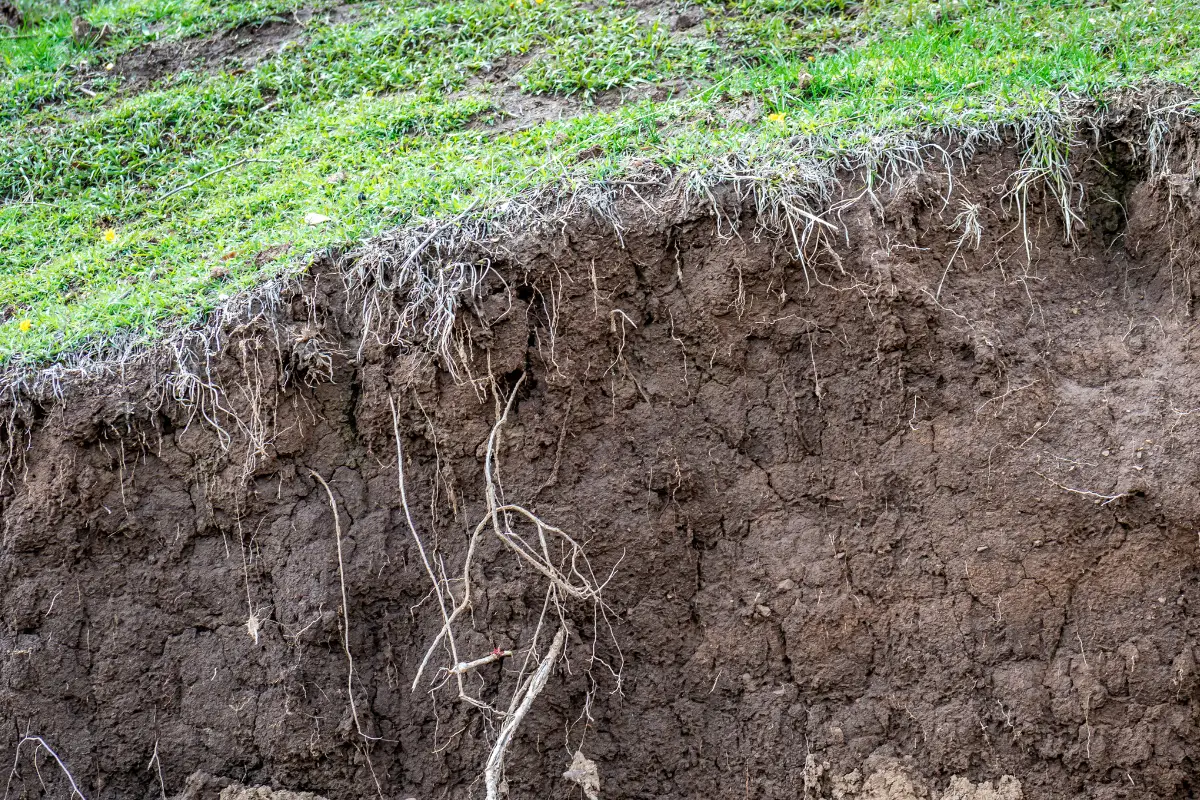
Heavy rains or overwatering your garden can cause soil to wash into the pond. For pot ponds, soil in your water plant pots can also put soil into your pond. Soil can muddy the water and give it a brown color. Soil particles can remain suspended in the water for quite a long time if thy are fine enough, leading to persistent brown water.
Fix
Creating a barrier of plants around the pond can help reduce soil runoff. Additionally, avoid placing the pond in an area where it is likely to be flooded with soil and sediment. For pot ponds, make sure you don’t use soil in your water plant pots – instead just use a porous gravel media.
3. Algae Growth
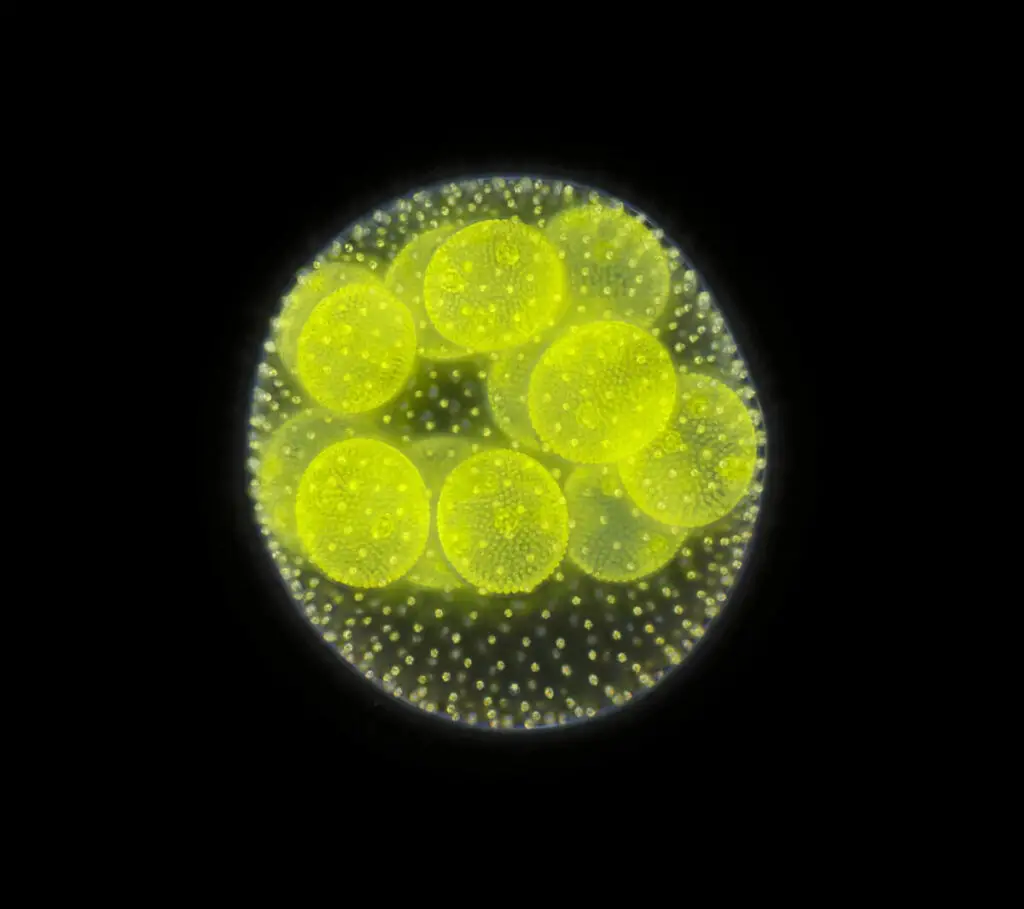
Although algae are more often associated with green water, certain types of algae can cause the water to appear brown. Some algae may float in the water, while others may coat the bottom and sides of the pond, giving it a brown appearance.
Fix
To manage algae, avoid overfeeding fish and use algae control products if necessary. However, be cautious with chemical treatments, as they can harm pond life.
Introducing algae-eating fish or beneficial bacteria can also help maintain balance.
High-quality beneficial bacteria products specifically designed for ponds safe for fish or plants are usually available in liquid or dry packet forms that you dissolve in water. Strains of nitrifying bacteria, such as Nitrosomonas and Nitrobacter, convert ammonia into less harmful substances.
4. Fish Waste, Feeding and Overstocking
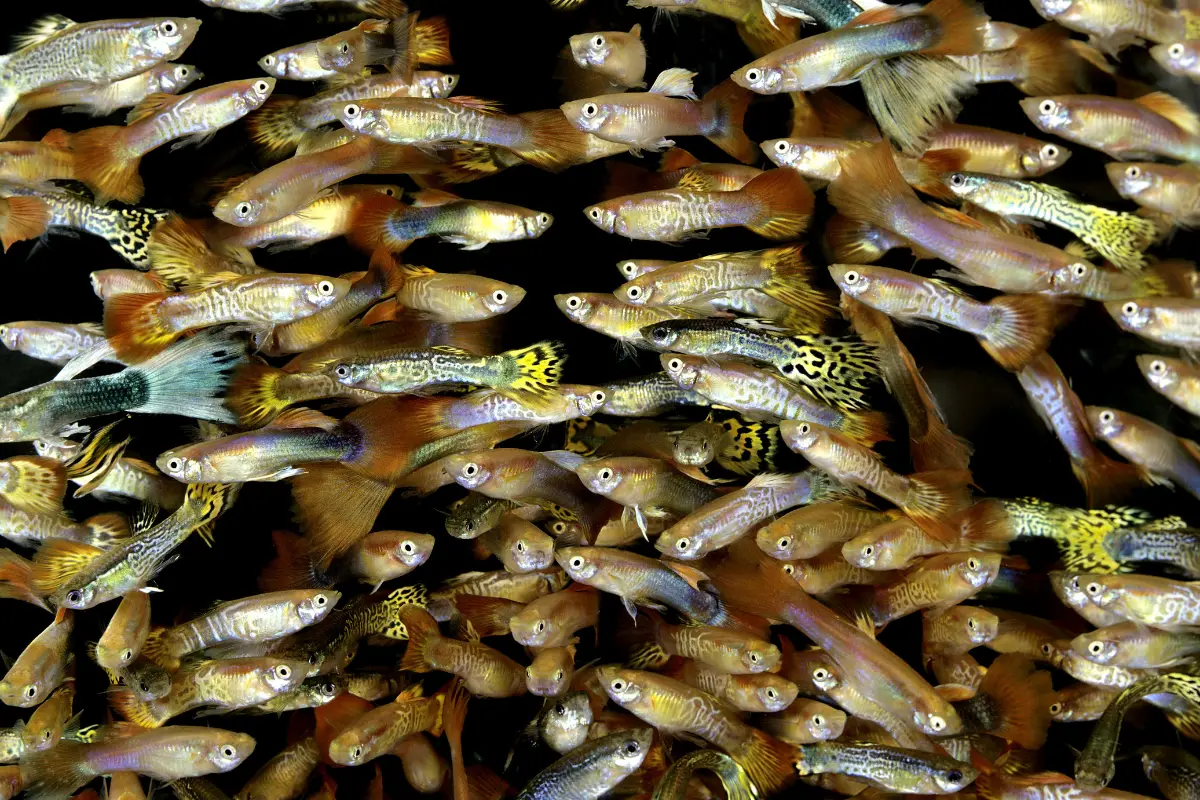
Excessive fish waste and reduced oxygen levels can lead to water conditions that cause brown pond water. Overfeeding fish can exacerbate this issue, as uneaten food contributes to the waste. When a pond is overstocked with fish, a significant amount of waste can be produced, which upsets the balance of the pond ecosystem increasing the likelihood of brown pond water as the waste breaks down.
Fix
Ensure that you are not overfeeding your fish and that the pond is not overstocked. You could also consider giving away some of your fish to a friend to reduce the population in your pond.
5. Lack of Filtration
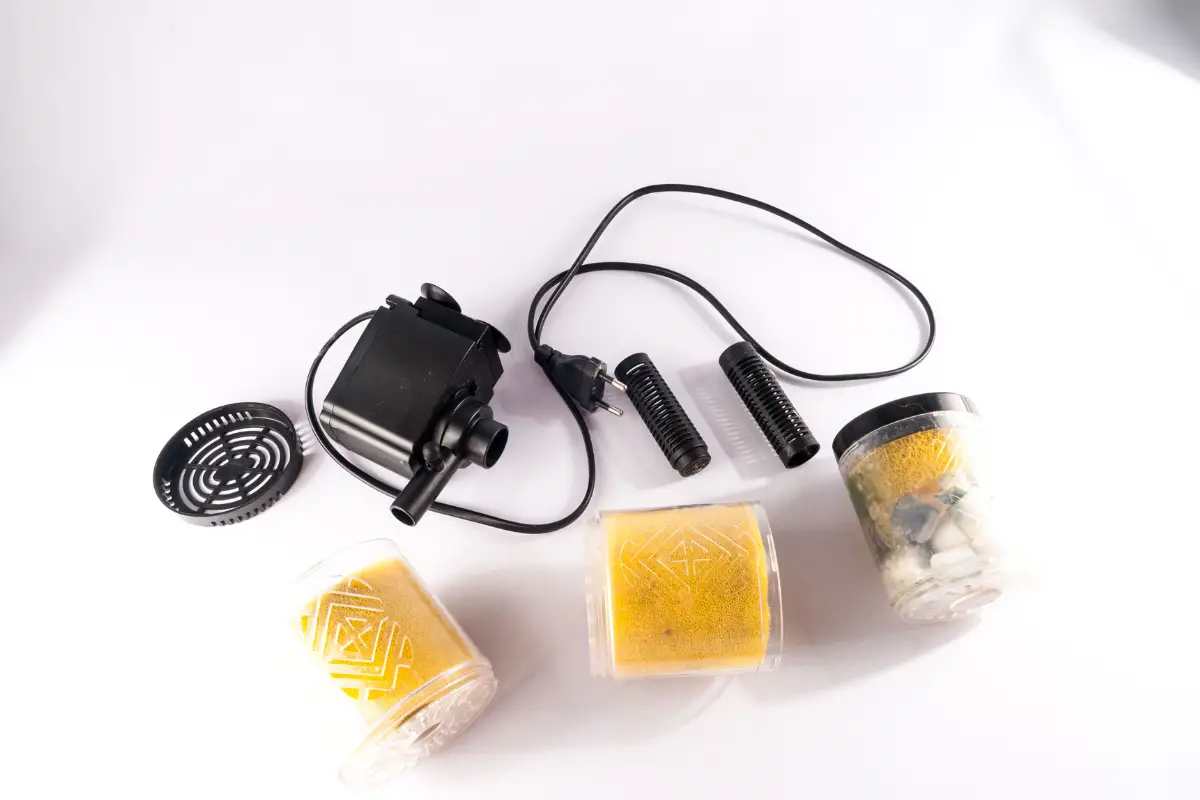
Inadequate filtration can fail to remove debris and waste from the water effectively, resulting in brown water. A good filtration system is crucial to maintain clear water.
Fix
Many ponds have pretty basic filters. Typically they just have a mesh screen or block of foam for removing small particles – half of which end up back in the pond when you remove the filter for cleaning!
Installing an adequate filtration system that is appropriate for the size of your pond and the number of fish will help to keep the water clear. But if you can’t upgrade the size of your filter, you may just have to spend a little more time manually removing the debris and muck that ends up accumulating at the bottom of your pond.
Is Brown Pond Water Harmful?
Brown pond water can be harmful to fish and frogs if it is a result of poor water quality, such as the presence of harmful chemicals or a lack of oxygen. Tannins themselves are not necessarily harmful, but they can indicate other issues.
Oxygen Content and pH
Brown water can decrease the oxygen content if it is due to excessive organic decay or overstocking of fish. It can also change the pH of the water, making it more acidic, which is not ideal for most pond life.
Disturbing Debris
Stirring up the pond water or disturbing the debris can harm fish, as it can release gases trapped in the sediment, lower oxygen levels, and alter pH by increasing bacterial consumption of oxygen and releasing acids from decaying organic matter.
To remove this debris with minimal disturbance to oxygen and pH levels, gently siphon the sediment from the bottom using a pond vacuum or a siphon hose, doing so gradually over several days to avoid a sudden change in the chemistry of the water. This method allows for the controlled removal of waste without significantly disrupting the pond’s balance.
Water Plants That Can Help
Certain water plants can help remove the brown color from pond water naturally. These include:
- Water lilies can shade the pond and reduce the decay of organic matter by keeping the water cool.
- Hornwort helps to oxygenate the water and can absorb nutrients that would otherwise feed algae.
- Water lettuce can absorb excess nutrients and provide shade, reducing the growth of algae.
Snails That Can Help
Snails can be fantastic helpers in maintaining a healthy pond environment. These little creatures are excellent at breaking down organic waste, which includes decomposing plants, fish waste, and uneaten food. This natural cleaning process helps to prevent the pond from becoming clogged with debris, which can otherwise lead to water quality issues, such as brown water.
Among the best choices for pond snails are:
- Ramshorn Snails, which are great algae-eaters but should be monitored for overpopulation.
- Trapdoor Snails are robust, manage colder climates well, and don’t reproduce as quickly.
- Mystery Snails are larger and known for their effective cleaning and attractive appearance.
- Nerite Snails are algae control champions and don’t reproduce in freshwater, which makes them ideal for keeping populations in check.
However, it’s important to maintain a balanced number of snails to avoid any potential problems. Overpopulation can contribute to waste rather than reduce it. Additionally, some snails may also pose a risk to live plants if they are not strictly algae-eaters. Also, bear in mind that snails need healthy living conditions. If the water quality is poor, it can harm the snails, leading to further issues in the pond.
Artificial Methods That Can Help
- UV clarifiers that use ultraviolet light to kill algae.
- Pond vacuums to remove debris from the bottom of the pond.
- Water treatments that are safe for fish and plants but target the removal of excess nutrients and waste (e.g. activated carbon).
Fixing Brown Water without Harming Fish
To fix brown water without harming fish or frogs, consider:
- Gradual water changes over a few days to dilute the concentration of tannins or other contaminants.
- Use of activated carbon in the filter to remove tannins and improve water clarity.
- Introduce beneficial bacteria to break down organic waste safely.
- Adding plants that absorb excess nutrients and provide shade.
- Increasing aeration to boost oxygen levels and support the breakdown of waste.
